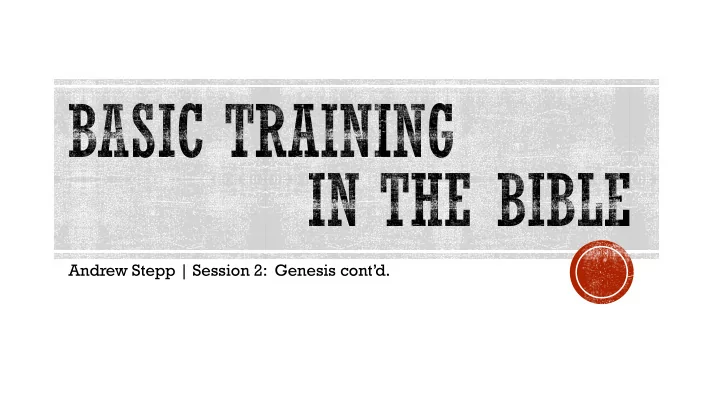

Andrew Stepp | Session 2: Genesis cont’d.
C R E A T I O N
Review Week One Brief Group Exercise Outline of Genesis The Major Plot of Gen. Five subplots
2 Challenges: The Nature of the Reader The Nature of Scripture
Every reader is at the same time an interpreter. We invariably bring to the text all that we are …our experiences, culture, and prior understandings of words and ideas.
…because God chose to speak his word through human words in history, every book in the Bible also has historical particularity; each document is conditioned by the language, time, and culture in which it was originally written.
God chose to use almost every available genre of communication: narrative history, genealogies, chronicles, laws, poetry, proverbs, prophetic oracles, riddles, drama, biographical sketches, parables, letters, sermons, and apocalypses. God’s Word was communicated over a 1500 year period, is it was expressed in the vocabulary and thought patterns of those persons and conditioned by their culture and circumstances. God’s Word to us was first God’s Word to them.
We need training, and we need the community. Those are powerful tools in the hands of the HOLY SPIRIT! This is a training ground. This is an invitation to dig into God’s Word. This is an opportunity to build a framework that can help us 1) To mine familiar texts for the deeper treasures 2) To equip us to wade through the deeper, more challenging texts.
Weekly includes an overview of each book, tips on what to look for, and a reading plan for the week. Opportunities for you to give me feedback Opportunities for you to shape the curriculum. Community – “This is NOT a discussion class… but it doesn’t mean we can’t be friends.”
Be here! Either physically or electronically Read your Bible! Interact with the text Mark it up! Share with me what you’re learning – what’s surprising, frustrating, comforting, exhilarating, confusing or all of the above! Consider joining a small group
For you to grow! …And for me to grow! To KNOW Scripture – Jesus knew Scripture, obviously… but his audience and Paul’s audience and Peter’s audience KNEW Scripture. The more you know Scripture the more alive it becomes! To grow in our Christ-likeness For the Holy Spirit to shape our hearts as we spend time in his Word.
How to Read the Bible for All Its Worth by Fee and Stuart
An Old Testament narrative usually does not directly teach a doctrine…Narratives record what happened – not necessarily what should have happened We are not always told at the end of a narrative whether what happened was good or bad. We are expected to be able to judge this on the basis of what God has taught us directly and categorically elsewhere in Scripture. Narratives are not written to answer all our theological questions. … In the final analysis, God is the hero of all biblical narratives .
Jacob & Esau Tower of Babel Eve Abraham Noah Joseph Adam Isaac & Ishmael Methuselah Cain and Abel Shem, Ham, & Japheth
Adam Eve Cain and Abel Methuselah Noah Shem, Ham, & Japheth Tower of Babel Abraham Isaac & Ishmael Jacob & Esau Joseph
Primeval (Gen. 1-11) Patriarchal (Ch. 12-50)
Creation (God’s image and the cultural mandate) Adam & Eve (aka The Fall!) Noah and the Ark (aka God’s Judgment on humankind!) The Tower of Babel (Human’s shattered pride!)
Abraham (Gen. 11-25) Isaac (25-26) Jacob (27-36) Joseph (37-50)
GOD = THE ULTIMATE INITIATOR
God is intervening in the history of human fallenness by choosing a man and his family. God = the Ultimate initiator Creation & Covenant “I will…” - God
Noah (9:9-11) – “As for me, I am establishing my covenant with you and your descendants after you, and with every living creatur… that never again shall all flesh be cut off by the waters of a flood, and never again shall there be a flood to destroy the earth.” Abraham (12:1-3) – “Go from your country and your kindred and your father’s house to the land that I will show you. I will make of you a great nation, and I will bless you, and make your name great, so that you will be a blessing. I will bless those who bless you, and the one who curses you I will curse; and in you all the families of the earth shall be blessed.”
Between God and Satan Adam/Eve & the Serpent (3:14-15) Strife between the godly seed & the ungodly Cain/Abel Ishmael/Isaac Esau/Jacob
God regularly bypasses the firstborn. (Cain, Ishmael, Esau, Reuben) The godly seed is born from barren women (Sarah, Rebekah, Rachel). Can you name any other barren mothers in the Bible? The chosen ones are not chosen because of their own goodness; their flaws are faithfully narrated. What makes them “godly” is that in the end they trust God and his promise.
Ch. 38 – Dude, really??? Weakness and sinfulness on full display. 43-44 – He’s willing to sacrifice himself for his brother Benjamin. 49:8-12 – Jacob’s Blessing: “the scepter will not depart from Judah” (David and Jesus!)
Oh those dirty Hammites!! (10:6-18) Moabites and Ammonites have been gross since they were conceived! (19:30-38) Esau Edomites (25:23)– (Herod the Great!) Ishmael (12 tribes as well!) (25:12-18)
Option 1: Genesis 27-50 5 Days x 5 chapters (-1) Option 2: Five Shorter Readings: Genesis 27-28 – Jacob and Esau, Pt. 1 Chapters 29-31- Jacob and Laban 32-33 – Jacob and Esau, Pt. 2 34, 35, 37, 38 – A few mostly terrible stories 42-45 – Joseph forgives his brothers
Recommend
More recommend